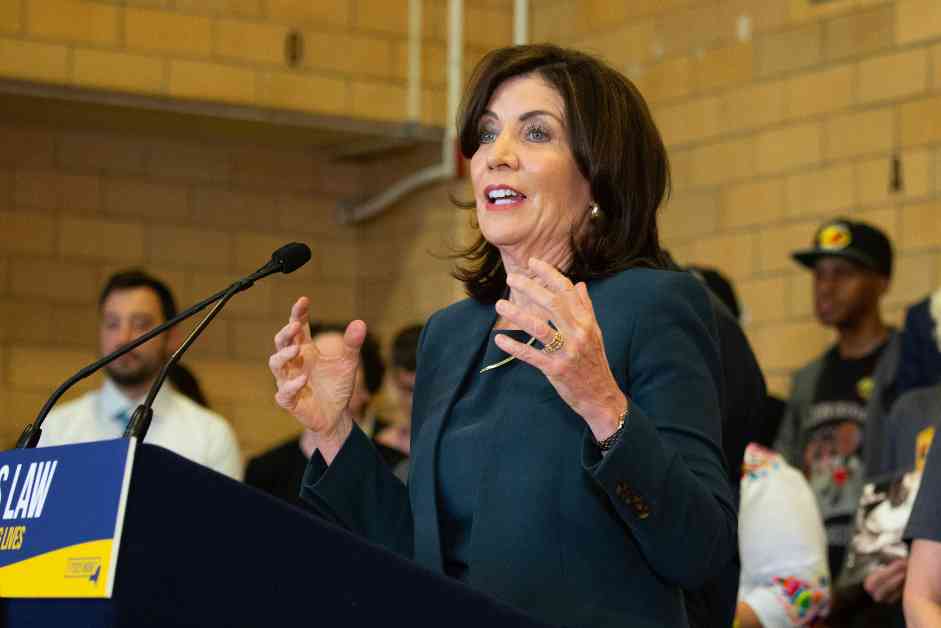Emergency Declaration Urged by Opioid Settlement Advisory Board Members
As the opioid crisis continues to ravage communities across New York, calls for Governor Kathy Hochul to declare a public health emergency have grown louder. Advocates and providers working on the front lines of the crisis believe that such a declaration could accelerate efforts to mitigate the devastating impact of opioid overdoses.
The Opioid Settlement Fund Advisory Board, responsible for recommending the allocation of funds from settlements with pharmaceutical companies linked to the crisis, recently met to discuss the urgent need for a public health emergency declaration. Many board members expressed frustration over the state’s reluctance to take this crucial step.
Joyce Rivera, a board member and CEO of St. Ann’s Corner of Harm Reduction in the Bronx, emphasized the importance of leveraging the board’s power to push for a public health emergency declaration. She stated, “When you have power, as we do, you should use that power.”
The staggering toll of opioid overdoses in New York City is evident in the record-high number of deaths reported in 2022. According to the city Department of Health, there were 3,026 overdose deaths, the highest since data collection began in 2000. The spike in overdose deaths coincided with the early years of the Covid-19 pandemic, disproportionately affecting Black New Yorkers and residents of the Bronx and Staten Island.
Despite mounting pressure from advocates and lawmakers, Governor Hochul has resisted declaring a public health emergency, citing ongoing efforts to address the crisis. However, the bipartisan task force on Staten Island and 56 state lawmakers have urged her to reconsider, highlighting the potential benefits such a declaration could bring.
Provisional data from the Centers for Disease Control and Prevention indicates a decrease in overdose deaths in New York state and New York City compared to previous years. While this progress is promising, the need for comprehensive measures to combat the opioid crisis remains urgent.
Subheadings:
Challenges in Addressing the Opioid Crisis
Advocates’ Push for a Public Health Emergency Declaration
Governor Hochul’s Response and Ongoing Efforts
At the recent advisory board meeting, members expressed a sense of accountability in holding the governor accountable for her decisions regarding the crisis. Ashley Livingston, a board member, emphasized the importance of advocating for a public health emergency declaration to increase pressure on the state for a robust response.
Tracie Gardner, co-director of the National Black Harm Reduction Network and advisory board member, highlighted the need to utilize all available tools to address the opioid crisis effectively. She underscored the importance of establishing pilot overdose prevention centers as a critical step in saving lives and providing support for individuals struggling with addiction.
Despite the existence of two overdose prevention centers in New York City, their legality remains a contentious issue. The sites operate under an agreement between the mayor and the police, as they are considered illegal under federal, state, and local laws. The advisory board has consistently advocated for using settlement funds to support these centers, but Governor Hochul has expressed opposition to this approach.
In a report issued this month, New York City detailed the allocation of settlement funds, receiving a total of $154.3 million. The city appropriated $33 million in funds in the past fiscal year, with Mayor Eric Adams unveiling plans to allocate $50 million annually by fiscal year 2027. However, concerns have been raised about the lack of transparency in the city’s spending of settlement funds, as reported by THE CITY earlier this year.
The advisory board is set to reconvene on September 24 to continue discussions on addressing the opioid crisis and advocating for critical interventions to save lives and support communities affected by the epidemic.
In conclusion, the urgency of the opioid crisis in New York demands decisive action from state leaders to declare a public health emergency and implement comprehensive strategies to combat the epidemic. The voices of advocates, providers, and affected communities must be heard in the ongoing efforts to address the devastating impact of opioid overdoses and save lives.
